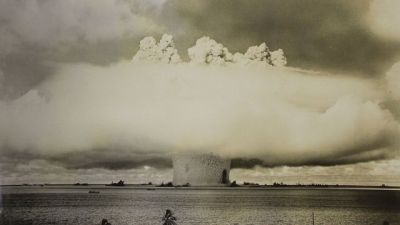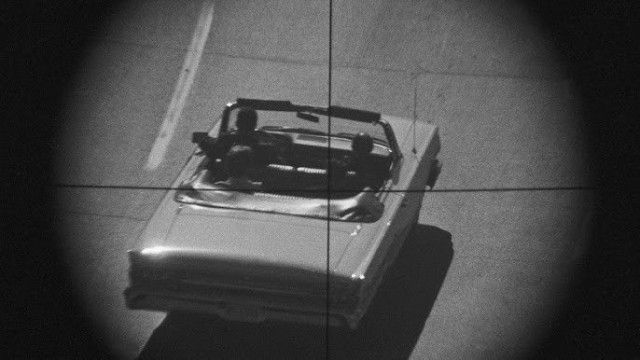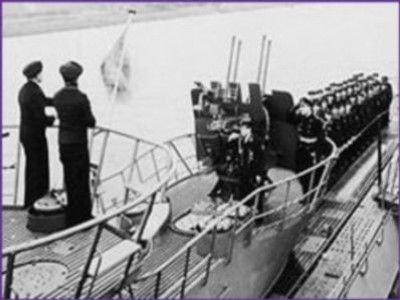The BEST episodes written by Rushmore Denooyer

#1 - The Bomb
PBS Specials - Season 2015 - Episode 18
The story of nuclear weapons, from the earliest A-bomb tests to their impact on global politics. Included: remarks from historians Richard Rhodes, Martin Sherwin, Robert Norris and Sergei Khrushchev; former secretary of state George Shultz; and former defense secretary William Perry. It began innocently enough. In 1938, two German chemists accidentally discovered how to split the nucleus of the uranium atom: nuclear fission. Einstein’s E=mc² equation predicted that the amount of energy released from just one atom would be enormous. Physicists all over the world immediately realized that fission might make a bomb of extraordinary power - and that Nazi Germany might be capable of creating one. The fear of Adolph Hitler getting a nuclear weapon led to a race to deter him by developing such a bomb first. Thus began a chain of events that would lead inexorably to Hiroshima, the nuclear arms race, the hydrogen bomb, the Cuban Missile Crisis and some of the greatest fear and tension ever in world history. The Bomb explores how what started as simple scientific curiosity ultimately resulted in a weapon capable of ending civilization. The invention, says historian Richard Rhodes, “Was a millennial change in human history: for the first time, we were now capable of our own destruction, as a species.” The program recounts the bomb’s history, as well as the successes, failures and moral dilemmas of the personalities who created it. We learn how it was developed and how it quickly changed everything, from international relations to politics, culture, even sex. No less than the discovery of fire, the bomb marks a dividing line in human history between all that came before it, and everything that follows. For the first time, humans acquired the ability to destroy themselves, and we are still struggling to learn how to live with this awesome power. Decades after it first appeared, the bomb has receded in the public consciousness — but it continues to shap
Watch Now:Amazon
#2 - Cold Case JFK
NOVA - Season 40 - Episode 22
For decades, the assassination of John F. Kennedy has fueled dark rumors of conspiracies and mishandled evidence. Now, fifty years later, NOVA asks: Could modern investigators do better? We’ll see how state-of-the art forensic tools would be applied to the investigation were it to happen today. At the same time, NOVA takes a critical look at contemporary cases, like the murders of Nicole Brown Simpson and Ronald Goldman, to reveal how charges of evidence mishandling and human error can mar even scientifically sophisticated detective work. Will forensics ever be truly foolproof, or does modern technology just give a scientific sheen to a practice that will always be more art than science?

#3 - Hitler's Lost Sub
NOVA - Season 27 - Episode 17
The film follows a six-year odyssey by a group of divers to identify a mysterious U-boat they discovered in 1991 off the coast of New Jersey
#4 - Hubble's Amazing Rescue
NOVA - Season 36 - Episode 11
The best-known scientific instrument in history was dying. After nearly 20 years in space and hundreds of thousands of spectacular images, the Hubble Space Telescope's gyroscopes and sensors were failing, its batteries running down, and some of its instruments were already dead. The only hope to save Hubble was a mission so dangerous that in 2004 NASA cancelled it because it was considered too risky.
#5 - Titanic's Achilles Heel
History Channel Documentaries - Season 2007 - Episode 23
For years, the focus of the Titanic disaster has been on the notorious iceberg that gouged the ship as it cruised through the North Atlantic in April 1912. But was the iceberg the only thing that contributed to the sinking of this legendary vessel? In this eye-opening program, follow the History(R) crew as it explores the explosive theory that the doomed liner may have had a fatal design flaw - one which could have caused it to sink even if it had not struck the iceberg. While examining data from the crew's pioneering 2005 expedition to the Titanic wreck site, marine architect Roger Long was shown a document from the Belfast shipbuilder Harland and Wolff, which illustrated a curious feature of the Titanic - a poorly designed expansion joint. Could this have been the weak point in the ship that caused it to break in two as it sank on the night of April 15, 1912? To find out, elite divers Richie Kohler and John Chatterton, along with their team, return to the Titanic, and later explore the wreck of its equally ill-fated sister ship, the Britannic, in search of evidence to substantiate Long's theory. Featuring advanced CGI technology, archive documents and photographs, as well as footage from the modern-day History(R) expeditions, "Titanic's Achilles Heel" is a remarkable journey into the ongoing legacy of a ship that continues to capture the world's attention.